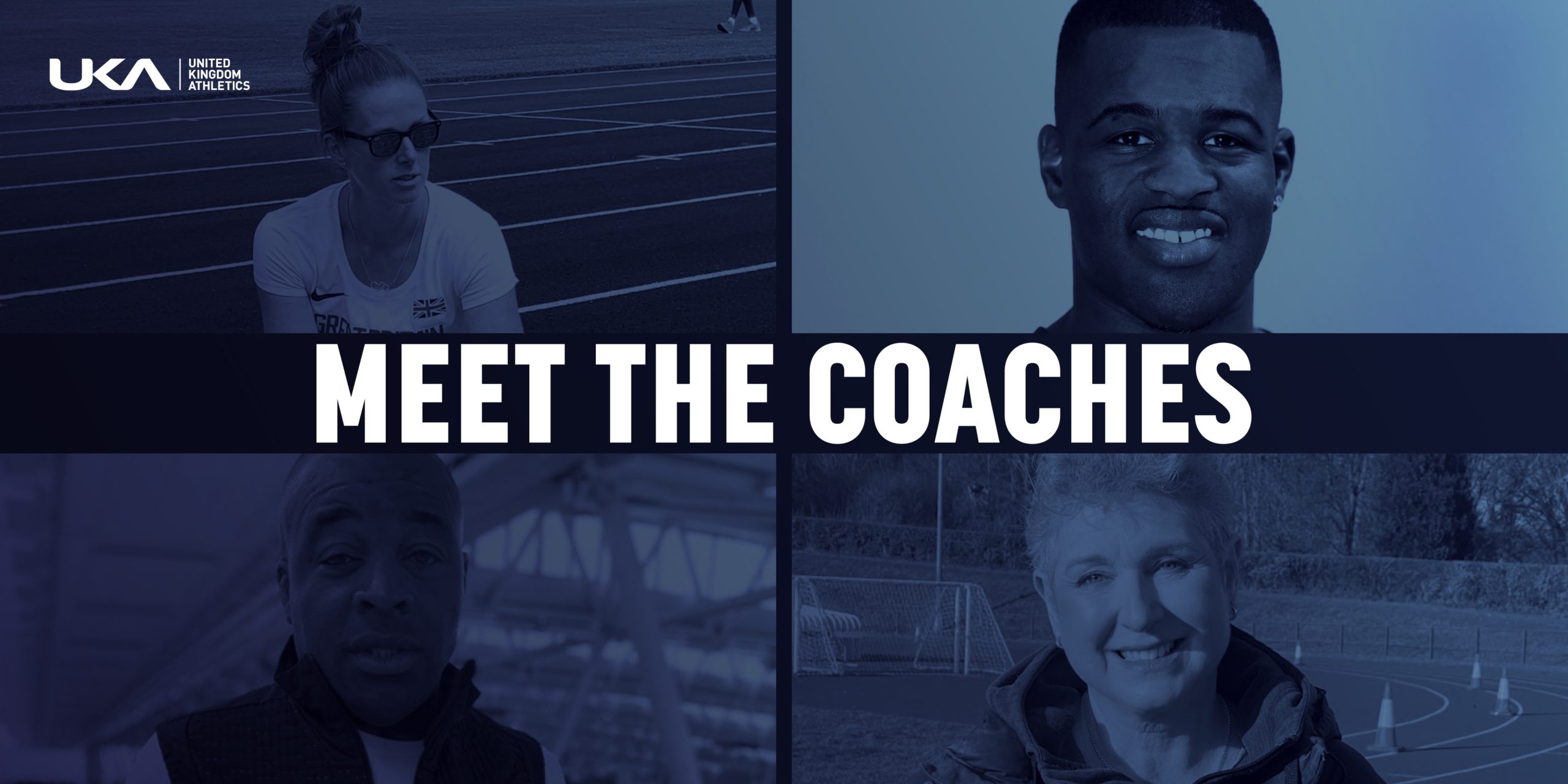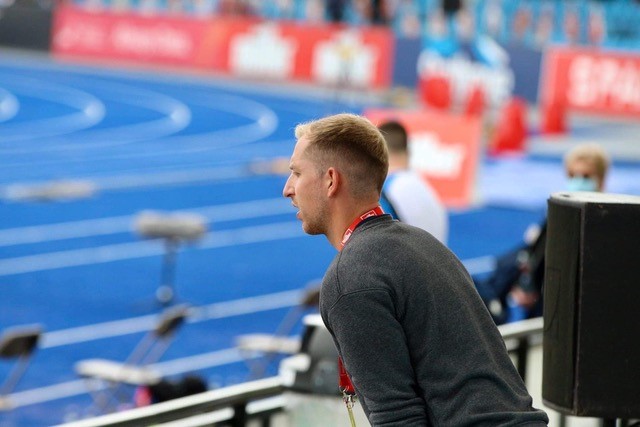
7th June 2022
COACH PROFILE: JAMES WRIGHT
JAMES WRIGHT

Rugby and Northampton AC
Wright Track
What is your athletics background?
After winning a four-event athletics challenge when I was 9, I was asked to join my local athletics club, Rugby & Northampton AC. My passion for athletics grew from there!
I started out doing middle-distance and cross country before trying multi-events. A major knee injury forced me to switch to hurdles when I was 15. After making various national championships, I managed to win a medal at my last ever English Schools in the sprint hurdles.
At university I switched back to combined events. In 2016 I was selected to compete for GB&NI in a U23 indoor combined events international match. It had been my goal ever since I started athletics to represent my country, so this was a huge achievement for me.
A year or so later I semi-retired from competitive athletics to concentrate on coaching after a few more injuries.
How long have you been coaching and in what field?
I took my Coaching Assistant course at 16 and my full coach qualification at 18. I followed this up with the event group qualification in sprints and hurdles. I am now a full-time coach having set up my own coaching business, Wright Track Coaching, in 2018.
I have been passionate about coaching from a young age. At U15 my hurdles coach left the club, but I continued training under the guidance of my mum. This change encouraged me to think about how to plan sessions, structure training programmes and look more in depth at sprint and hurdle technique.
This continued into my time at Loughborough University where I studied Economics and trained for decathlon. Alongside this, I coached sprint hurdles to a small group of heptathletes and travelled back to Rugby twice a week to work with some talented hurdlers at my local club.
After finishing my studies, I wasn’t sure what career I wanted to pursue. In the end I decided it was important for me to do something I was passionate about, something I would love doing for a living. Athletics and coaching were my main passions, so I decided to take a risk and move back to Rugby to establish myself as a full-time self-employed coach.
I now coach about 30 athletes from U15 through to senior level as part of my various academy groups. The group contains a lot of highly ranked juniors in the UK across sprints, hurdles, and jumps. We also have numerous national and international medallists at U15 to U20 level.
Alongside the academy groups, I organise sessions for U11/U13 athletes, holiday athletics courses and athletics sessions in schools. I support my older athletes through their coach assistant qualification, and they deliver initiatives. This works well as the athletes understand the coaching philosophy I am trying to implement, and it also offers them flexible part time work to support their training.
I run all these activities with the support of my local club, Rugby & Northampton AC. I have a fantastic relationship with the club, and they’ve been hugely supportive of my coaching ventures. The partnership works well as we support each other to ensure that both parties and the athletes thrive!
What is your coaching philosophy?
I adopt an athlete-centred approach, the long-term development of the athlete is at the heart of everything I do. I have set up an athlete development pathway based on the UKA long term athlete development model. The aim of this is to give the athletes the technical and physical tools along with the right mindset they need to transition from junior to senior level.
At the base I have the community activities which aim to attract and engage kids with athletics. They then feed into my U11/U13 sessions which is all about fundamentals and building good movement foundations for any sports, not just athletics.
The next stage is my development academy groups, where I take a multi-event approach. I find avoiding early specialisation develops more technically proficient and versatile athletes, and it also avoids mental burnout.
As the athletes develop, they move through to the performance groups. Here they tend to specialise in their chosen event. Training becomes more structured and focused on performance.
Throughout this pathway, I aim to give athletes the best possible foundations to succeed in the sport. This involves developing good movement and technical skills in various events. I also try and develop good physical foundations through strength and conditioning sessions. This involves learning how to lift in the gym in a controlled manner alongside important strength development as the athletes are maturing.
I also try and take a holistic approach when it comes to athlete development. It’s important as a coach you’re aware that you’re not just working with athletes, you are working with kids who are trying to understand themselves and develop as a person.
What keeps you motivated?
As a young coach I am always looking to learn and develop my coaching knowledge and skills. My main motivation has always been to help young athletes unlock their potential. The more experience and knowledge I can gain the better equipped I am to help the athletes be the best they can be.
I was forced to stop my own journey as an athlete quite early. I have a big injury history that goes back to my development through my teenage years. This is a big reason I got into coaching in the first place. I love working with the junior age groups and am hugely passionate about trying to bridge the gap to senior level through everything I do.
What do you consider your biggest achievement from a coach perspective?
Managing to retain most of my athletes through the multiple lockdowns was really rewarding for me. As a group we managed to keep training and stay together through numerous 1-1 sessions, online drills/S&C sessions, and various quizzes/activities on zoom. I was so impressed with how all the athletes handled this difficult period and it’s amazing to see them performing so well on the track now.
Coaching Ed Faulds to double European U20 Gold last summer was a huge highlight for me. I have always watched the junior championships so to see an athlete I coach produce a performance of that level on that stage was a special moment for me.
This achievement has opened doors for Ed and for me. Being at the Indoor Grand Prix as a coach was a fantastic experience and then seeing him go on to sign his first kit deal was another big moment. We have a great relationship and we’re both learning as we go and pushing each other to be better all the time.
Overall, my biggest achievement is managing to turn my passion for athletics and coaching into my career. This hasn’t been easy in a sport with limited professional opportunities as a coach. Also being a self-employed coach through the pandemic had a lot of difficulties, so I’m proud I managed to still develop my business through this period.
What are your ambitions for 2022/23?
We’re coming up to a very busy point in the season so that’s where the short-term focus is. As a group we’ve got regional, national and possibly international competitions coming up, so hopefully we will see some PBs and medals at these competitions.
Looking ahead, my aim is keep developing the business. I’d love to be able to add more coaches to the Academy groups, to support the work I’m doing. This would allow me to expand some of the different levels and event groups.
Over the next few years, I would also like to see some of the Academy athletes continue to progress towards international junior and hopefully senior level. It would be amazing to see athletes come from the entry level of the pathway and move all the way up to make a major senior championships.
Another personal ambition is to try and work my way towards being on team staff for a junior championships over the next few years. I have been a Team Manager for Warwickshire at English Schools for several years and it’s always one of the highlights of the season. I would love to take that a step further and get on the team staff at an international level.


